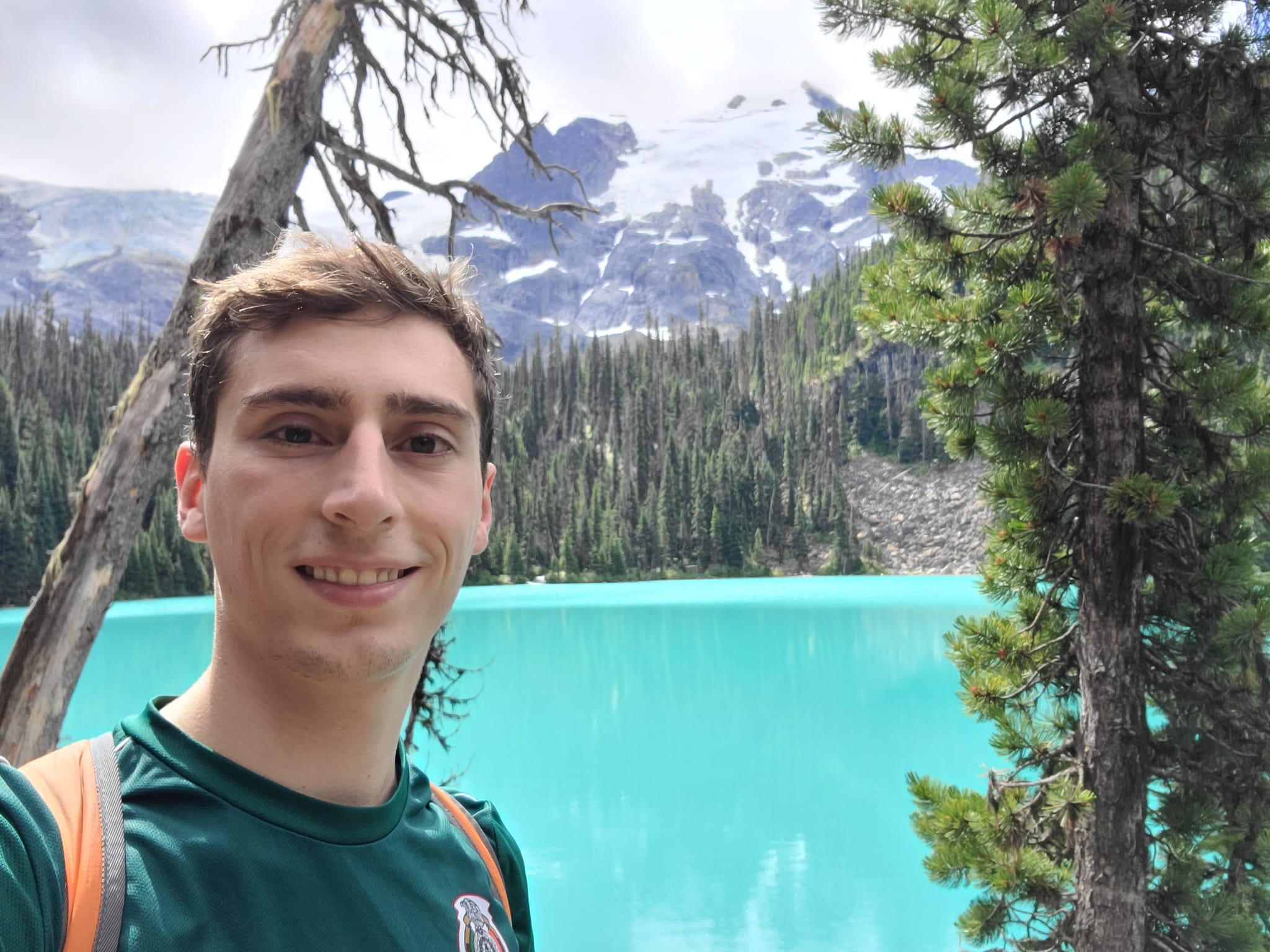Intro

My name is Andres Ross and I'm very excited about the AI revolution we are experiencing. I love using applied mathematics and machine learning to solve a variety of problems.
Having worked in multiple interdisciplinary projects I believe links between different fields to be key in 21st-century research. I have experience in a wide variety of fields such as mathematical engineering, biophysics, AI for medicine, and molecular simulations.
Outside of work I enjoy basketball, fantasy stories and sunshine.
Experience

MSc applied math (Dr. Ortner)
- Researching the use of ML techniques for molecular simulation.
- Specifically, the use of nonlinear regression models.
- Experience with, neural networks, SD, LSQR, ADAMS, linesearch methods, pre-conditioning, and other numerical methods.
- Taken classes on: stochastic differential equations, advanced machine learning, control theory, optimal transport, numerical analysis and dynamical systems.
Astrophysics Research (Dr. Cline)
- Studied the maximal amount of dark matter allowed in neutron stars.
- Treating dark matter as a mirror copy of the neutron and using the theory for degenerate Fermi gases.
- Using Runge-Kutta we showed that for a polytropic equation of state neutron stars cannot contain more than 16% dark matter.
Honors Thesis (Dr. Nave, Dr. Navarra)
"Finite Difference and Discrete Event Simulation Applied To Copper Smelter Dynamics"
- The objective was precise quantitative modelling of a copper smelter.
- Such a model is important since it reduces the risk when investing large capital into smelter equipment.
- The main challenge was accounting for the interplay of discrete events in the factory, with continuous dynamics inside the furnaces.
- Using Runge-Kutta methods and Newton iterations combined with discrete event siulation I modeled the smelter.
- Worked as the bridge between engineering and applied mathematics, learning a lot about interdisciplinary collaboration.
- My work was published in the proceedings of Philip Mackey Honorary Symposium as well as on an issue of Process Modeling in Pyrometallurgical Engineering.
- https://doi.org/10.3390/pr8111478
The Ottawa Hospital Research Institute
"Adaptive margins with an early system for motion-tracking errors in liver SBRT"
- Worked on real time prediction of errors during radiation treatment.
- I successfully developed a machine learning algorithm from the ground up that predicts errors with 84% accuracy.
- For this, I used a combination of support vector machines, clustering, time series analysis, and statistical features.
- I also developed a real-time program for adaptive breathing control.
- This program would be used by patients to ease treatment.
- This research was published for the 61st American Association of Physicists in Medicine Annual Meeting.
Abstract
Biophysics Research (Dr. François)
"Exploring the use of Mutual Information as a Fitness Function for Parameter Reduction"
- The aim of my project was understanding mutual information as a cost function for parameter reduction in an immune detection model.
- Using eigendecomposition techniques I reduced the dimensionality of the system and analyzed its behavior.
- I was able to show that the mutual information outperforms other cost functions.
Skills

Programing
- Python (PyTorch, SkLearn, SciPy, Pandas)
- Julia (development of ACE.jl)
- Java
- Matlab and HTML (basic knowledge)
Analytics
- Message Passing Neural networks
- Automatic differentiation and Adjoints
- Modeling Differential Equations (partial and stochastic)
- Signal Analysis (DTW, Fourier Transform, Euclidean Distance, MJC, etc)
- Statistical Analysis (Mutual Information, entropy, standard deviation, skewness, kurtosis, etc)
- Machine Learning (SVM, K-Means Clustering, Confusion Matrix, ROC, PCA, Regression, Logistic Regression, Lasso Regression, Normalization, etc)
- Numerical analysis (Runge-Kutta, Krylov subspace, spectral, Quasi-Newton and methods)
- Molecular Simluation (Langevin dynamics, photon spectra and ML inter atomic potentials)
- Discrete Event Simulation, future event list, and interplay with thresholds of continous variables.
Language
- Spanish (Native Language)
- English (Proficient)
- French (Working Proficient)
Publications
Publications
Navarra, A.; Wilson, R.; Parra, R.; Toro, N.; Ross, A.; Nave, J.-C.; Mackey, P.J. Quantitative Methods to Support Data Acquisition Modernization within Copper Smelters. Processes 2020, 8, 1478. https://doi.org/10.3390/pr8111478.
Quantitative Methods to Support Data Acquisition Modernization within Copper Smelters
A. Navarra, A. Ross, N. Toro, F. Ayala and T. Marin, “Quantitative methods for copper smelter reengineering projects”, Peer-reviewed contribution to the proceedings of the Philip Mackey Honorary Symposium (Copper 2019).
proceedings of Philip Mackey Honorary Symposium
M. Liu, A. Ross, J. E. Cygler, and E. Vandervoort. " TH-A-SAN2-10: Adaptive Margins with An Early Warning System for Motion-Tracking Errors in Liver SBRT.” Med. Phys. 46(6), 499-500, 2019. Presented at 61st American Association of Physicists in Medicine Annual Meeting (San Antonio, TX)
Abstract
Awards
- International Tuition Award - Sep 2020 UBC
- Faculty of Science Graduate Award - Aug 2020 UBC
- Science Undergraduate Research Award (funding for research) - May 2017 McGill University
- One-Year Undergraduate Entrance Scholarship McGill - Jun 2016 McGill University
- Hugh Brock Renewable Scholarship McGill - Jun 2016 McGill University
Honours
- First Class Honours in Mathematics and Physics class of 2020 McGill University
Contact
andresrossb@gmail.com
Cell: (438)-928-8712


